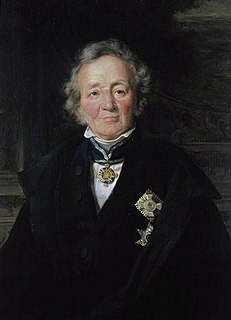A Quote by Leopold Von Ranke
He who overcomes himself is divine. Most see their ruin before their eyes; but they go on into it.
Related Quotes
By `God` I mean godliness; the whole existence is full of godliness. And when you will come to know, you will not see a god standing before you, you will see the trees as divine, the rocks as divine, the people as divine, the animals as divine. God is spread all over the place, from the pebble to the star, from the blade of grass to the sun - it is all divine.
Geometry, which before the origin of things was coeternal with the divine mind and is God himself (for what could there be in God which would not be God himself?), supplied God with patterns for the creation of the world, and passed over to Man along with the image of God; and was not in fact taken in through the eyes.
A man becomes spiritual insofar as he lives a spiritual life. He begins to see God in all things, to see His power and might in every manifestation. Always and everywhere he sees himself abiding in God and dependent on God for all things. But insofar as a man lives a bodily life, so much he does he do bodily things; He doesn't see God in anything, even in the the most wondrous manifestations of His Divine power. In all things he sees body, material, everywhere and always - "God is not before his eyes." (Ps. 35:2)
A Christian should put away all defense and make no attempt to excuse himself either in his own eyes or before the Lord. Whoever defends himself will have himself for his defense, and he will have no other. But let him come defenseless before the Lord and he will have for his defender no less than God Himself.
A benevolent malefactor, merciful, gentle, helpful, clement, a convict, returning good for evil, giving back pardon for hatred, preferring pity to vengeance, preferring to ruin himself rather than to ruin his enemy, saving him who had smitten him, kneeling on the heights of virtue, more nearly akin to an angel than to a man. Javert was constrained to admit to himself that this monster existed. Things could not go on in this manner.








































